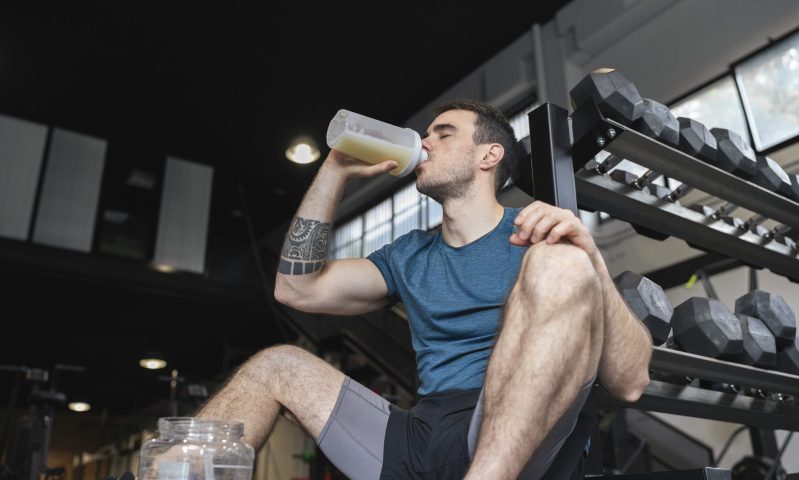Many fitness professionals and enthusiasts believe that there is a “best time to eat protein for maximum gains.” As a trainer and nutritionist, I stress to clients that getting in enough protein every day is the most important factor. However, some studies have addressed how protein timing could improve your chances of gaining muscle and prime your body for gains.
How? We’ve extensively looked at the science behind protein timing, including whether you should eat protein before or after a workout and how much protein you should eat in one meal, and we’ve laid out everything you need to know below. Continue reading to learn how to optimize your efforts at the gym through proper nutrient timing!
What the science says about protein timing

Mostly, when people discuss protein timing, it’s about whether one should consume protein before or after a workout. As such, there are several seemingly conflicting studies on the subject.
For example, one study published in the Journal of the International Society of Sports Nutrition suggests that people who are trying to maximize muscle gain should eat a leucine-containing protein source after working out. Leucine is an amino acid that is instrumental in instigating muscle protein synthesis and repair.
Another meta-analysis published in the same journal suggests that protein timing does not matter much, and the most important thing is total protein intake.
While the science may seem conflicting, there are several general guidelines to follow for eating and supplementing with protein for optimal muscle gains.
What is the best time to eat protein for muscle growth?

Technically, there’s no best time to eat protein for muscle growth. Instead, it’s best to ensure you’re getting enough protein consistently throughout the day — with special emphasis on eating protein around your workouts. A paper by the International Society of Sports Nutrition recommends consuming a quality protein source (roughly 20 to 40 grams) soon after resistance exercise (often within a few hours) to help stimulate muscle protein synthesis.
Does this mean the anabolic window exists? The anabolic window is a popular fitness and bodybuilding term that refers to a period after working out (30 to 60 minutes) where your body absolutely needs protein. Many fitness enthusiasts assert that your workout may be less effective or even useless if you don’t eat within this time frame.
The anabolic window is simply a theory, but the idea behind it is founded in science. The research concludes that there are no benefits to going hours without eating protein after a workout, but eating or supplementing with protein not long after has immense benefits. So, while you won’t lose all your gains if you don’t have that protein shake on your way home from the gym, it’s still advisable to ingest some protein as soon as you can.
Does protein intake frequency play a role in absorption?

Again, the science on this one is a little conflicting. A study published in Frontiers in Psychology advises that people eat 0.4 grams of protein per kilogram of body weight. For the average American man, this would amount to about 36 grams of protein per meal. According to this study, this is the optimal amount the body needs in one meal.
However, more recent research suggests that there is no maximum limit to how much protein you can eat per meal. A study by Cell Reports Medicine study asserts that eating as much as 100 grams of protein in one sitting is scientifically applicable.
The takeaway from this is that the most important factor when it comes to eating enough protein for muscle growth is not protein timing or frequency but total protein intake. Eating every few hours may not be convenient for people who work long shifts or are always on the go. Also, sometimes, you may not be able to eat immediately before or after working out.
If this is you, you should simply focus on meeting your required daily protein intake. If meeting this required intake in one or two meals is convenient for you, do it. Apart from the fact that eating like this will be effective, not obsessing over all the tiny details will result in a much better relationship with food and exercise. Remember, consistency is more important than almost anything else.
How much protein should you be eating to build muscle?

The United States Anti-Doping Agency (USADA) suggests eating 1.6 to 2.2 grams of protein per kilogram of body weight for optimal muscle growth. USADA bases its suggestion on two highly regarded studies asserting that this is the optimal daily protein intake to maximize muscle protein synthesis.
According to USADA, for a 150-pound person, 1.6 to 2.2 grams per kilogram of body weight “would equate to about 109 – 150 grams of protein per day.”
Example day of a high-protein diet

Here’s an example of a high-protein meal plan for a single day, including breakfast, lunch, dinner, and a healthy snack, along with their approximate calorie and protein content:
Breakfast: Vegetable omelet with spinach, tomatoes, and mushrooms and whole grain toast.
Lunch: Grilled chicken salad with mixed greens and quinoa
Dinner: Baked salmon with steamed broccoli and brown rice
Snack: Greek yogurt with berries and a protein shake
Depending on your portion sizes, this simple meal plan provides approximately 1,950 calories and 130 grams of protein. For someone who weighs around 50 kg and is trying to maintain a healthy weight, this plan not only supports proper calorie intake but also provides enough protein to support muscle growth.
Frequently asked questions

Is it better to eat protein in the morning or at night?
It does not matter very much when you eat protein — what’s important is that you meet your daily intake. The United States Anti-Doping Agency suggests optimal protein intake for muscle growth to be 1.6 to 2.2 grams of protein per kilogram of body weight.
Is it smart to eat protein before bed?
Ingesting protein before bed can be beneficial for muscle repair and growth during sleep. Slow-digesting proteins, such as casein found in cottage cheese, provide a steady release of amino acids overnight, supporting muscle protein synthesis.
What are the symptoms of too much protein in the body?
Excessive protein intake can lead to various health issues, including kidney strain, dehydration, digestive disturbances, and an increased risk of cardiovascular diseases. It’s advisable to balance protein consumption within recommended guidelines to avoid these adverse effects.




